Similar presentations:
The form of modal auxiliaries
1.
CONTENTS7-1 The form of modal auxiliaries
7-2 Expressing ability: can and could
7-3 Expressing possibility: may, might, and maybe Expressing …
7-4 Using could to express possibility
7-5 Polite questions: may I, could I, can I
7-6 Polite questions: would you, could you, will you, can you
7-7 Expressing advice: should and ought to
7-8 Expressing advice: had better
7-9 Expressing necessity: have to, have got to, must
7-10 Expressing lack of necessity: do not have to Expressing: …
7-11 Making logical conclusions: must
7-12 Tag questions with modal auxiliaries
7-13 Giving instructions: imperative sentences
7-14 Making suggestions: let's and why don't
7-15 Stating preferences: prefer, like...better, would rather
1
2.
7-1 THE FORM OF MODAL AUXILIARIESSomebody should clean up this mess.
2
3.
7-1 THE FORM OF MODAL AUXILIARIESAUXILIARY + SIMPLE FORM OF VERB
can
(a) Inga can play the violin.
could
(b) They couldn’t arrive on time.
may
(c) It may be a nice day tomorrow.
might
(d) It might be a nice day tomorrow.
3
4.
7-1 THE FORM OF MODAL AUXILIARIESAUXILIARY + SIMPLE FORM OF VERB
should
(e) Inga should go inside.
had better
(f) You had better go inside.
must
(g) He must be gentle with the cat.
will
(h) They will attend the recital.
would
(i) I would like to meet her.
4
5.
7-1 THE FORM OF MODAL AUXILIARIESAUXILIARY + SIMPLE FORM OF VERB
can
might
could
should
may
must
had better
would
will
not followed by to
Inga can to play the violin.
5
6.
7-1 THE FORM OF MODAL AUXILIARIESAUXILIARY + SIMPLE FORM OF VERB
can
might
could
may
should
must
had better
would
will
no final -s
Inga can plays the violin.
6
7.
7-1 THE FORM OF MODAL AUXILIARIESAUXILIARY + SIMPLE FORM OF VERB
can
might
could
should
may
must
had better
would
will
not in past form
Inga can played the violin.
7
8.
7-1 THE FORM OF MODAL AUXILIARIESAUXILIARY + SIMPLE FORM OF VERB
can
might
could
should
may
must
had better
would
will
not in -ing form
Inga can playing the violin.
8
9.
7-1 THE FORM OF MODAL AUXILIARIESAUXILIARY + TO + SIMPLE FORM OF VERB
have to
(j) You have to be on time.
have got to (k) He has got to be on time.
be able to
ought to
(l) He is able to be on time.
(m) He ought to be on time.
to + simple form
9
10.
7-1 LET’S PRACTICEto
Ø
to learn how to skate.
She has ___
10
11.
7-1 LET’S PRACTICEto
Ø
Ø learn how to skate.
She might ___
11
12.
7-1 LET’S PRACTICEto
Ø
She should ___
Ø learn how to skate.
12
13.
7-2 EXPRESSING ABILITY: CAN AND COULDI can’t believe that!
13
14.
7-2 EXPRESSING ABILITY: CAN AND COULD(a) Dolphins can jump very high.
(b) They can swim long distances.
(c) They can be taught fancy tricks.
can
ability in present
or future
14
15.
7-2 EXPRESSING ABILITY: CAN AND COULDcan’t
(d) I cannot
can not
fix this computer.
three negative forms
of can
15
16.
7-2 EXPRESSING ABILITY: CAN AND COULD´
(e) Amy can play tennis.
´
(f) Doug can’t play tennis.
can
can’t
unstressed
sounds like “kun”
stressed
sounds like “kæn”
16
17.
7-2 EXPRESSING ABILITY: CAN AND COULD(g) When we were in college, we could play
chess for hours.
could
=
past form of can
17
18.
7-2 EXPRESSING ABILITY: CAN AND COULD(h) I couldn’t play chess in graduate school.
I had to study all the time.
couldn’t
or
could not
=
negative form
of could
18
19.
7-2 EXPRESSING ABILITY: CAN AND COULD(i). Mia can use a camera.
(j). Mia is able to use a camera.
(k). Mia could use a camera.
(l). Mia was able to use a camera.
be able to
same
meaning
same
meaning
ability
19
20.
7-2 LET’S PRACTICEcan
can’t
can’t
He is always upset when he _______
remember something.
20
21.
7-2 LET’S PRACTICEcan
can’t
A dolphin ______
can’t run,
but it ______
can jump.
21
22.
7-2 LET’S PRACTICEcan
can’t
You ______
can bring a horse
to water, but you ______
can’t
make him drink it.
22
23.
7-3 EXPRESSING POSSIBILITY: MAY, MIGHT ANDMAYBE; EXPRESSING PERMISSION: MAY AND CAN
Maybe Alice heard some bad news.
23
24.
7-3 EXPRESSING POSSIBILITY: MAY, MIGHT ANDMAYBE; EXPRESSING PERMISSION: MAY AND CAN
(a) It may snow this week.
(b) It might snow this week.
may, might
same
meaning
possibility
24
25.
7-3 EXPRESSING POSSIBILITY: MAY, MIGHT ANDMAYBE; EXPRESSING PERMISSION: MAY AND CAN
(c)
Can we
finish this by
Monday?
I don’t know.
mightbebe
We may
ready by then.
25
26.
7-3 EXPRESSING POSSIBILITY: MAY, MIGHT ANDMAYBE; EXPRESSING PERMISSION: MAY AND CAN
(d) It may not snow this week.
(e) It might not snow this week.
Negative: may not, might not
no contractions
26
27.
7-3 EXPRESSING POSSIBILITY: MAY, MIGHT ANDMAYBE; EXPRESSING PERMISSION: MAY AND CAN
(f) Maybe it will snow tomorrow.
COMPARE
(g) Maybe the test will be hard.
adverb
maybe
“possibly”
beginning of sentence
(h) The test may be hard.
verb
may be = may + the main verb be
27
28.
7-3 EXPRESSING POSSIBILITY: MAY, MIGHT ANDMAYBE; EXPRESSING PERMISSION: MAY AND CAN
(i) Yes, you may borrow my pen.
more formal
(j) Sure, you can borrow my pen. less formal
may
permission
can often used, too
28
29.
7-3 EXPRESSING POSSIBILITY: MAY, MIGHT ANDMAYBE; EXPRESSING PERMISSION: MAY AND CAN
(k) You may not borrow my pen.
You can’t borrow my pen.
may
deny permission
can often used, too
29
30.
7-3 LET’S PRACTICEmay be done with
I _______
this project tomorrow.
maybe
may be
30
31.
7-3 LET’S PRACTICEMaybe I’ll be done
_______
with this project
tomorrow.
maybe
may be
31
32.
7-3 LET’S PRACTICEmaybe
can
The boss told me
can use
that we ____
the new color
printer.
32
33.
7-4 USING COULD TO EXPRESS POSSIBILITYThis could be a long walk.
33
34.
7-4 USING COULD TO EXPRESS POSSIBILITY(a) Could you
understand the
lecture?
Not really. I could only
understand the first
few minutes.
could
past ability
34
35.
7-4 USING COULD TO EXPRESS POSSIBILITY(b)
Why isn’t this
working?
I don’t think it’s serious.
It could just be a weak
battery.
present
Could =
possibility
35
36.
7-4 USING COULD TO EXPRESS POSSIBILITY(c)
This error could
cause problems in
the whole company.
future
Could =
possibility
36
37.
7-4 LET’S PRACTICEI’d like to visit a beautiful place.
We could go to Thailand.
present
OR
future
37
38.
7-4 LET’S PRACTICEOh, no! This could be a problem!
present
OR
future
38
39.
7-4 LET’S PRACTICEThis car doesn’t run. The battery could
be dead.
present
OR
future
39
40.
7-5 POLITE QUESTIONS: MAY I, COULD I, CAN IMay I help you?
40
41.
7-5 POLITE QUESTIONS: MAY I, COULD I, CAN IPOLITE QUESTION
(a) May I please take your picture?
(b) Could I please take your picture?
(c) Can I please take your picture?
POSSIBLE ANSWERS
Yes.
Of course.
Yes. Of course.
Sure.
Okay.
Certainly.
Sorry, not today.
Yes. Certainly.
Uh-huh.
41
42.
7-5 POLITE QUESTIONS: MAY I, COULD I, CAN IPOLITE QUESTION
(d) Can I take your picture, please?
(e) Can I take your picture?
please - at the end
no please - also ok
42
43.
7-5 LET’S PRACTICECORRECT
?
YES
NO
Can I please borrow your car?
43
44.
7-5 LET’S PRACTICECORRECT
?
YES
NO
May I borrow your car?
44
45.
7-5 LET’S PRACTICECORRECT
?
YES
NO
Could I borrow please your car?
45
46.
7-6 POLITE QUESTION: WOULD YOU, COULD YOU,WILL YOU, CAN YOU
Would you please sit still?
46
47.
7-6 POLITE QUESTION: WOULD YOU, COULD YOU,WILL YOU, CAN YOU
POLITE QUESTION
(a) Would you please explain that again?
(b) Could you please explain that again?
(c) Will you please explain that again?
(d) Can you please explain that again?
basically the same meaning
47
48.
7-6 POLITE QUESTION: WOULD YOU, COULD YOU,WILL YOU, CAN YOU
POLITE QUESTION
(a) Would you please
explain that again?
POLITE ANSWERS
Yes.
Sure.
Uh-huh.
(b) Could you please
Yes. Of course.
explain that again?
(c) Will you please
Certainly. Okay.
explain that again?
(d) Can you please
Of course. I’d be glad to.
explain that again?
I’m sorry. I don’t have time.
48
49.
7-6 POLITE QUESTION: WOULD YOU, COULD YOU,WILL YOU, CAN YOU
POLITE QUESTION
(a) Would you please
explain that again?
(b) Could you please
explain that again?
(c) Will you please
explain that again?
(d) Can you please
explain that again?
INCORRECT:
May you please
explain that again.
can is less formal
49
50.
7-6 LET’S PRACTICECORRECT
?
YES
NO
Could you wash my car yesterday?
50
51.
7-6 LET’S PRACTICECORRECT
?
YES
NO
Will you wash my car, please?
51
52.
7-6 LET’S PRACTICECORRECT
?
YES
NO
May you please wash my car?
52
53.
7-7 EXPRESSING ADVICE: SHOULD AND OUGHT TOThey should go home and get
some rest.
53
54.
7-7 EXPRESSING ADVICE: SHOULD AND OUGHT TOshould
(a) I have a headache. I
take a nap.
ought to
(b) INCORRECT: I should to take a nap.
(c) INCORRECT: I ought taking a nap.
should + simple form of verb
ought + to + simple form of verb
54
55.
7-7 EXPRESSING ADVICE: SHOULD AND OUGHT TO(d) You need to study. You should not go out.
You need to study. You shouldn’t go out.
NEGATIVE: should + not = shouldn’t
Ought to
not usually used in negative
55
56.
7-7 EXPRESSING ADVICE: SHOULD AND OUGHT TOI don’t understand
the assignment.
What should I do?
(e)
QUESTION: should + subject + main verb
Ought to
not usually used in questions
56
57.
7-7 EXPRESSING ADVICE: SHOULD AND OUGHT TO(f)
You should
come in to see
me.
57
58.
7-7 EXPRESSING ADVICE: SHOULD AND OUGHT TO(f)
You ought to
come in to see
me.
58
59.
7-7 EXPRESSING ADVICE: SHOULD AND OUGHT TO(g)
Maybe you
should come
in to see me.
59
60.
7-7 EXPRESSING ADVICE: SHOULD AND OUGHT TO(g) Maybe you ought to come in to see me.
maybe + should, ought to
softens advice
60
61.
7-7 LET’S PRACTICEshould
I need a book
about geology.
You should go
to the library.
61
62.
7-7 LET’S PRACTICEought to
I need a book
about geology.
You ought to go
to the library.
62
63.
7-7 LET’S PRACTICEmaybe, should
I need a book
about geology.
Maybe you should go
to the library.
63
64.
7-8 EXPRESSING ADVICE: HAD BETTERThey had better go home and get
some rest.
64
65.
7-8 EXPRESSING ADVICE: HAD BETTERshould
(a) I have a headache. I ought to take a nap.
had better
should
ought to
had better
same
meaning
good idea, good advice
65
66.
7-8 EXPRESSING ADVICE: HAD BETTER(b) He’d better be careful. His pan is on fire!
Had better usually = warning
66
67.
7-8 LET’S PRACTICEYou’d better quit watching
TV all day.
Possible bad results?
eat too much
catch a cold
hurt your eyes
not study enough
not exercise enough
67
68.
7-8 LET’S PRACTICEHe’d better not walk there.
Possible bad results?
fall
get hurt
get the flu
be embarrassed
fail a test
68
69.
7-8 LET’S PRACTICEHe’d better stay awake in school.
Possible bad results?
miss something
get hurt
get in trouble
fail a test
get the flu
69
70.
7-9 EXPRESSING NECESSITY: HAVE TO,HAVE GOT TO, MUST
This man has to wear ear protection.
70
71.
7-9 EXPRESSING NECESSITY: HAVE TO,HAVE GOT TO, MUST
(a) I want to become a doctor.
have to
I have got to go to medical school.
must
have to
have got to
had better
same
meaning
something is necessary
71
72.
7-9 EXPRESSING NECESSITY: HAVE TO,HAVE GOT TO, MUST
(b)
I need to hurry.
I have to go to
soccer practice.
72
73.
7-9 EXPRESSING NECESSITY: HAVE TO,HAVE GOT TO, MUST
(c) It’s late. We’ve got to go home.
73
74.
7-9 EXPRESSING NECESSITY: HAVE TO,HAVE GOT TO, MUST
(d) Everyone must wear a seatbelt on an
airplane.
(e) Sally, you must clean your room every
night.
74
75.
7-9 EXPRESSING NECESSITY: HAVE TO,HAVE GOT TO, MUST
(b) I have to go to soccer practice.
(c) We’ve got to go home.
(d) Everyone must wear a seatbelt on an airplane.
(e) Sally, you must clean your room every night.
have to
have got to
must
most common
informal conversation
written instructions
talking to young children
75
76.
7-9 EXPRESSING NECESSITY: HAVE TO,HAVE GOT TO, MUST
(f) Do you have to wear seatbelts in your car?
(g) Did they all have to come?
Questions
have to
have got to
must
76
77.
7-9 EXPRESSING NECESSITY: HAVE TO,HAVE GOT TO, MUST
(f) Do you have to wear seatbelts in your car?
(g) Did they all have to come?
Questions
have to
have got to
must
77
78.
7-9 EXPRESSING NECESSITY: HAVE TO,HAVE GOT TO, MUST
(f) Do you have to wear seatbelts in your car?
(g) Did they all have to come?
Questions
have to
have got to
must
78
79.
7-9 EXPRESSING NECESSITY: HAVE TO,HAVE GOT TO, MUST
(h) We had to clean up the mess.
have to
have got to
must
Past form:
had to
79
80.
7-9 EXPRESSING NECESSITY: HAVE TO,HAVE GOT TO, MUST
PRONUNCIATION
(i) I have to (“hafta”) call my mom.
(j) Jason has to (“hasta”) work tomorrow.
(k) I’ve got to (“gotta”) cook dinner tonight.
/hӕftә/ or /hӕftu/
/hӕstә/ or /hӕstu/
/gadә/ or /gәtә/
80
81.
7-9 LET’S PRACTICECORRECT
?
YES
NO
Do I must wash all the dishes?
81
82.
7-9 LET’S PRACTICECORRECT
?
YES
NO
Do I have to wash all the dishes?
82
83.
7-9 LET’S PRACTICECORRECT
?
YES
NO
Do I have got to wash all the dishes?
83
84.
7-10EXPRESSING LACK OF NECESSITY: DO NOT HAVE TO
EXPRESSING PROHIBITION: MUST NOT
You mustn’t talk on the phone
while you are driving.
84
85.
7-10EXPRESSING LACK OF NECESSITY: DO NOT HAVE TO
EXPRESSING PROHIBITION: MUST NOT
(a) I mowed the yard yesterday.
I don’t have to mow it this weekend.
not necessary
85
86.
7-10EXPRESSING LACK OF NECESSITY: DO NOT HAVE TO
EXPRESSING PROHIBITION: MUST NOT
(b) Alesha is on vacation.
She doesn’t have to go to work today.
not necessary
86
87.
7-10EXPRESSING LACK OF NECESSITY: DO NOT HAVE TO
EXPRESSING PROHIBITION: MUST NOT
(c) You must not swim here.
(d) You must not swim in this water.
Prohibition
(Do Not Do This!)
87
88.
7-10EXPRESSING LACK OF NECESSITY: DO NOT HAVE TO
EXPRESSING PROHIBITION: MUST NOT
(e) You mustn’t throw trash in the garden.
must + not = mustn’t
88
89.
7-10 LET’S PRACTICEWe cleaned the house this morning.
We _________________________
don’t have to clean the house now.
89
90.
7-10 LET’S PRACTICEI cooked dinner this morning.
I ______________________
don’t have to cook dinner tonight.
90
91.
7-10 LET’S PRACTICESwimming is prohibited.
must not / mustn’t swim here.
You _______________
91
92.
7-11 MAKING LOGICAL CONCLUSIONS: MUSTMary and Artie are smiling.
They must be happy.
92
93.
7-11 MAKING LOGICAL CONCLUSIONS: MUST(a) That woman is
very funny.
She must
be a
comedian.
best guess
must
OR
logical
conclusion
93
94.
7-11 MAKING LOGICAL CONCLUSIONS: MUSTCOMPARE
LOGICAL CONCLUSION
(b) My friends went skydiving.
They must be brave.
NECESSITY
(c) To become a scientist,
you must go to college.
94
95.
7-11 MAKING LOGICAL CONCLUSIONS: MUSTCOMPARE
NEGATIVE LOGICAL CONCLUSION
(d) Jed smokes.
He must not know that smoking is harmful.
PROHIBITION
(e) We need money for the future.
We must not spend it all now.
95
96.
7-11 LET’S PRACTICEnecessity
prohibition
logical conclusion
negative logical conclusion
Jenny swims everyday.
She must love to swim.
96
97.
7-11 LET’S PRACTICEnecessity
prohibition
logical conclusion
negative logical conclusion
Smoking is not allowed.
You must not smoke.
97
98.
7-11 LET’S PRACTICEnecessity
prohibition
logical conclusion
negative logical conclusion
If you want to graduate,
you must stay in school.
98
99.
7-12 TAG QUESTIONS WITH MODAL AUXILIARIESYou can keep a secret,
can’t you?
99
100.
7-12 TAG QUESTIONS WITH MODAL AUXILIARIES(a)
(b)
(c)
(d)
You can keep a secret, can’t you?
He won’t say anything, will he?
She should try, shouldn’t she?
They couldn’t come, could they?
(e) We would like to go, wouldn’t we?
Tag questions
are common with
can, will,
should, could,
and would
100
101.
7-12 TAG QUESTIONS WITH MODAL AUXILIARIES(f) You have to go, don’t you?
(g) You don’t have to go, do you?
(h) He has to leave, doesn’t he?
(i) He doesn’t have to leave, does he?
(j) You had to try, didn’t you?
(k) You didn’t have to to try, did you?
Tag questions
also with
have to, has to,
and had to
101
102.
7-12 TAG QUESTIONS WITH MODAL AUXILIARIES(f) You have to go, don’t you?
(g) You don’t have to go, do you?
(h) He has to leave, doesn’t he?
(i) He doesn’t have to leave, does he?
(j) You had to try, didn’t you?
(k) You didn’t have to to try, did you?
Tag questions
also with
use forms
have
to, has to,
do to
andofhad
102
103.
7-12 LET’S PRACTICEshould
They ______________
stop working,
should
_____________?
shouldn’t they
103
104.
7-12 LET’S PRACTICEhave to
She ______________
doesn’t have to work today, _______
does she
104
105.
7-12 LET’S PRACTICEwould
She ______________
like to ask a
would
question, _____________?
wouldn’t she
105
106.
7-13 GIVING INSTRUCTIONS: IMPERATIVESENTENCES
Listen to me!
106
107.
7-13 GIVING INSTRUCTIONS: IMPERATIVESENTENCES
COMMAND
(a)
Sit down! You
are in trouble.
Yes,
Mom.
107
108.
7-13 GIVING INSTRUCTIONS: IMPERATIVESENTENCES
REQUEST
(b)
Sit down,
please. I want
to talk to you.
Okay,
Mom.
108
109.
7-13 GIVING INSTRUCTIONS: IMPERATIVESENTENCES
DIRECTIONS
(c) Emma: So, where should I turn?
Adam: In two miles, turn right.
Then drive five miles to the
hotel on the left.
109
110.
7-13 GIVING INSTRUCTIONS: IMPERATIVESENTENCES
COMMAND
REQUEST
DIRECTIONS
(a) Sit down!
(b) Sit down, please.
(c) Turn right. Then drive five miles.
give commands
make polite requests
give directions
imperative
sentences
110
111.
7-13 GIVING INSTRUCTIONS: IMPERATIVESENTENCES
(d) Slow down!
111
112.
7-13 GIVING INSTRUCTIONS: IMPERATIVESENTENCES
(d) Slow down!
(e) Please slow down!
112
113.
7-13 GIVING INSTRUCTIONS: IMPERATIVESENTENCES
(d)
Slow down!
(f) Come
on!
(e) Please slow down!
(f) Come on!
subject of sentence = you (unspoken)
113
114.
7-13 GIVING INSTRUCTIONS: IMPERATIVESENTENCES
(g) Don’t worry. I won’t fall.
114
115.
7-13 GIVING INSTRUCTIONS: IMPERATIVESENTENCES
(g) Don’t worry. I won’t fall.
(h) Please don’t drive so fast.
115
116.
7-13 GIVING INSTRUCTIONS: IMPERATIVESENTENCES
(g) Don’t worry. I won’t fall.
(h) Please don’t drive so fast.
(i) Don’t do that again.
Don’t + simple form of a verb
116
117.
7-13 LET’S PRACTICE?
command
request
directions
Please don’t worry about me.
117
118.
7-13 LET’S PRACTICE?
command
request
directions
To use chopsticks, keep one finger over
the other, and use your thumb to direct the
movement.
118
119.
7-13 LET’S PRACTICE?
command
request
directions
Don’t swing so high!
119
120.
7-14 MAKING SUGGESTIONS: LET’S AND WHY DON’TLet’s try this approach.
120
121.
7-14 MAKING SUGGESTIONS: LET’S AND WHY DON’T(b)
(a)
Let’sdon’t
buy this
Why
we
one.
looks It
buy
thisIt one?
looksgood.
good.
That’s okay
with me.
121
122.
7-14 MAKING SUGGESTIONS: LET’S AND WHY DON’T(a) Let’s buy this one.
(b) Why don’t we buy this one?
same
meaning
suggestions about activities
122
123.
7-14 MAKING SUGGESTIONS: LET’S AND WHY DON’T(c)
I don’t know
which classes
to take.
Why don’t you
ask your
advisor?
friendly suggestion
123
124.
7-14 LET’S PRACTICELet’s
We have a big test tomorrow.
Let’s study together.
___________
124
125.
7-14 LET’S PRACTICEWhy don’t we
We have a big test tomorrow.
Why don’t we study together?
________________
125
126.
7-14 LET’S PRACTICEI don’t
understand
this report.
Why don’t you
Why don’t you look
________________
at this line?
126
127.
7-15 STATING PREFERENCES: PREFER,LIKE…BETTER, WOULD RATHER
I would rather have a
motorcycle than a car.
127
128.
7-15 STATING PREFERENCES: PREFER,LIKE…BETTER, WOULD RATHER
(a) I prefer motorcycles to cars.
prefer + noun + to + noun
(b) I prefer riding on a motorcycle to riding
in a car.
prefer + -ing verb + to + -ing verb
128
129.
7-15 STATING PREFERENCES: PREFER,LIKE…BETTER, WOULD RATHER
(c) I like motorcycles better than cars.
like + noun + better than + noun
(d) I like riding a motorcycle better than driving
in a car.
like + -ing verb + better than + -ing verb
129
130.
7-15 STATING PREFERENCES: PREFER,LIKE…BETTER, WOULD RATHER
(e) Ray would rather have a cat than a dog.
(f) INCORRECT: Ray would rather has a cat.
(g) I’d rather buy dinner than cook it.
(h) INCORRECT:
I’d rather buy dinner than to cook it.
I’d rather buy dinner than cooking it.
would rather
simple form of verb
130
131.
7-15 STATING PREFERENCES: PREFER,LIKE…BETTER, WOULD RATHER
(i) I’d/You’d/She’d/He’d/We’d/They’d rather
have a motorcycle.
Contraction of would = ’d.
l
(j) Would you rather have a car or a motorcycle?
would rather
or
polite situations / offers a choice
131
132.
7-15 LET’S PRACTICEthan
to
I like to play badminton better ____
than tennis.
132
133.
7-15 LET’S PRACTICEthan
to
I prefer badminton ___
to tennis.
133
134.
7-15 LET’S PRACTICEthan
to
I would rather play badminton ____
than tennis.
134
135.
PHOTO CREDITSCopyright © 2008 Pearson Education and
its licensors. All rights reserved.
Images used under license from:
• Shutterstock, Inc.
• Clipart, Inc.
135
135




















































































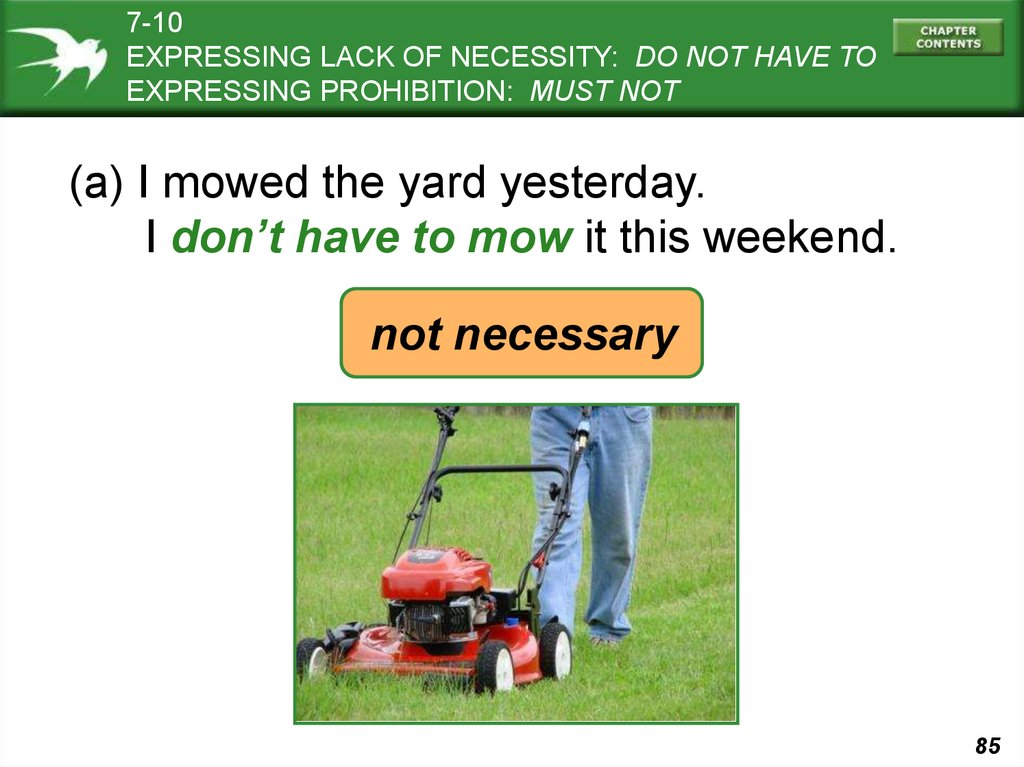


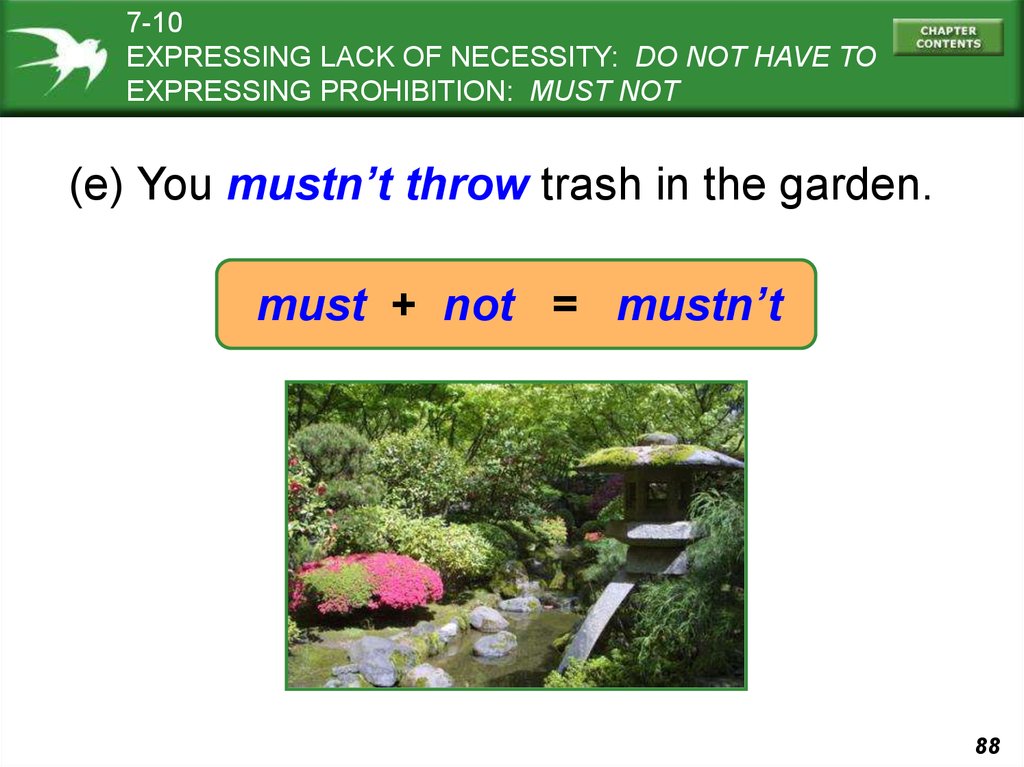
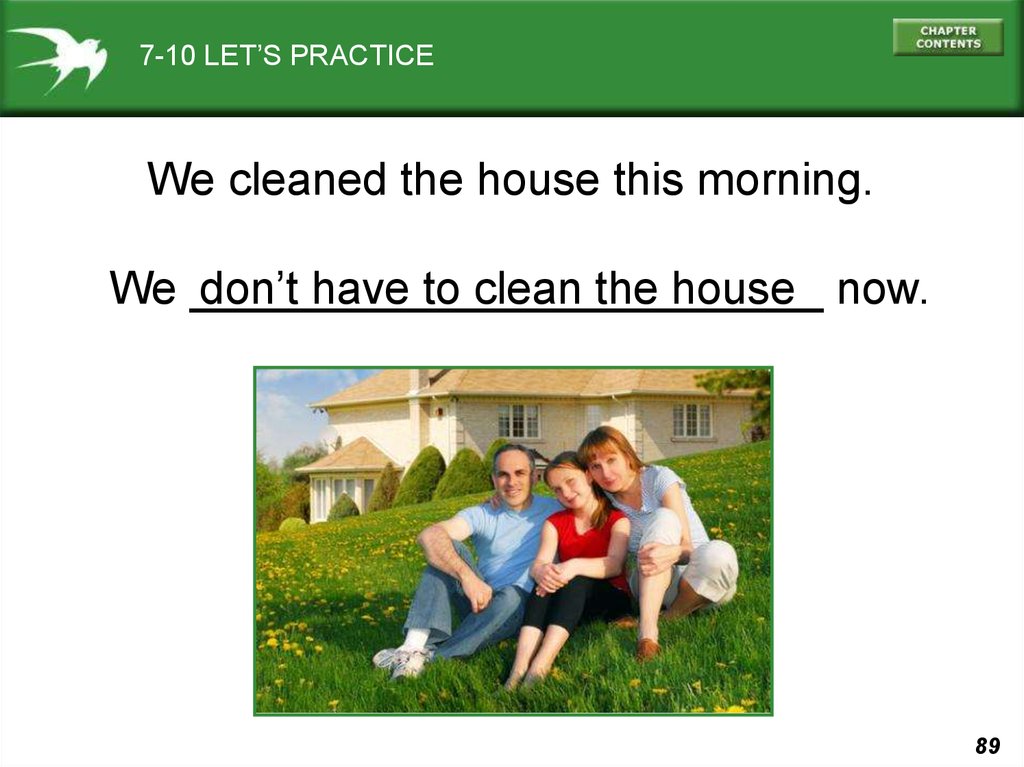
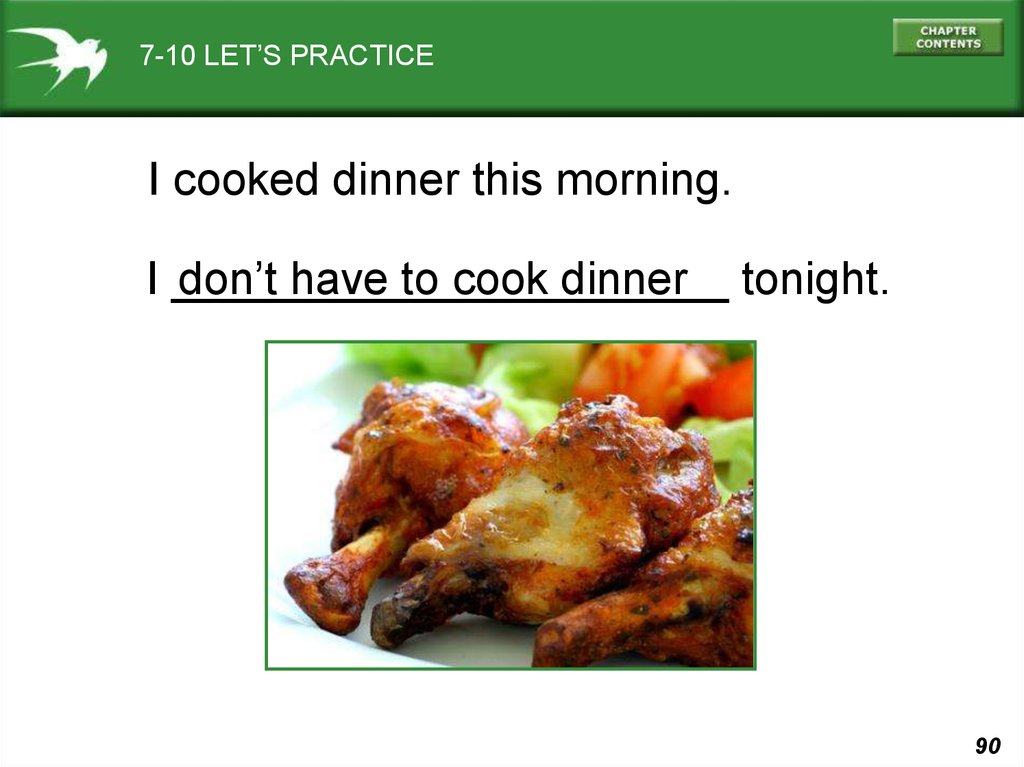
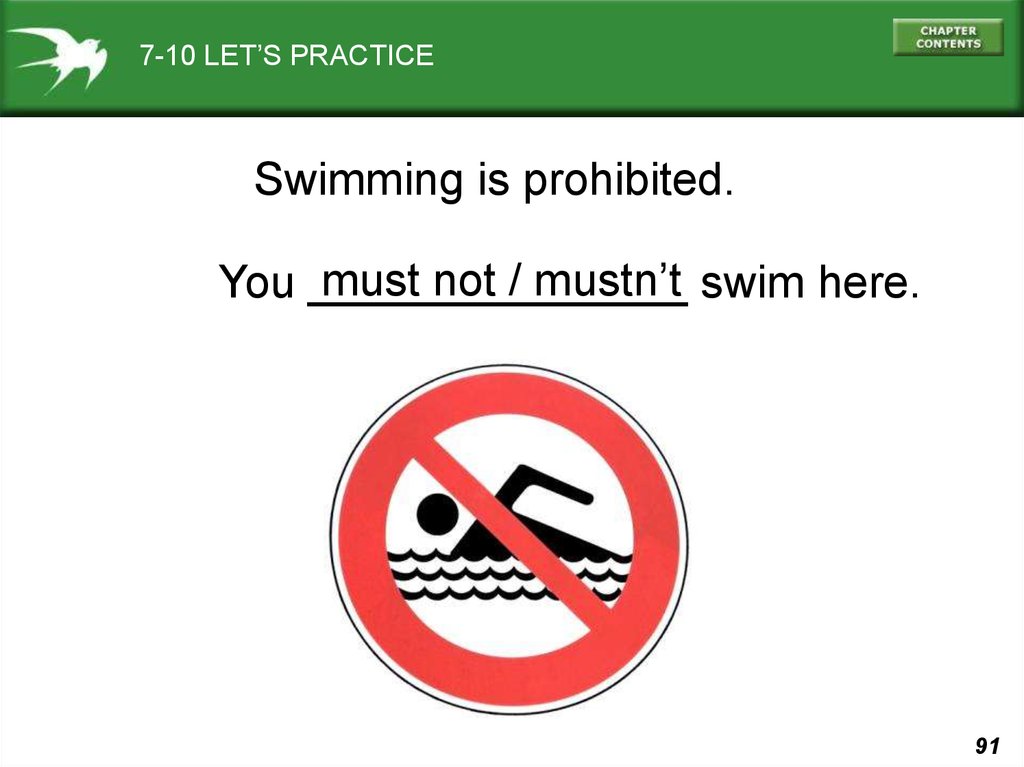
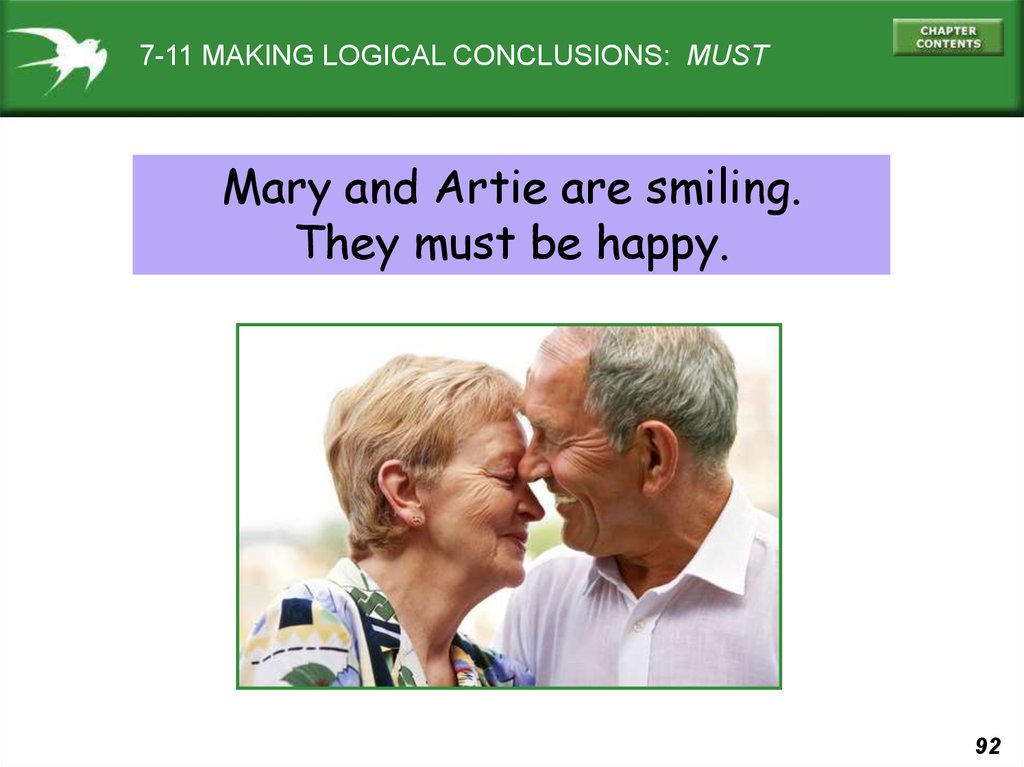
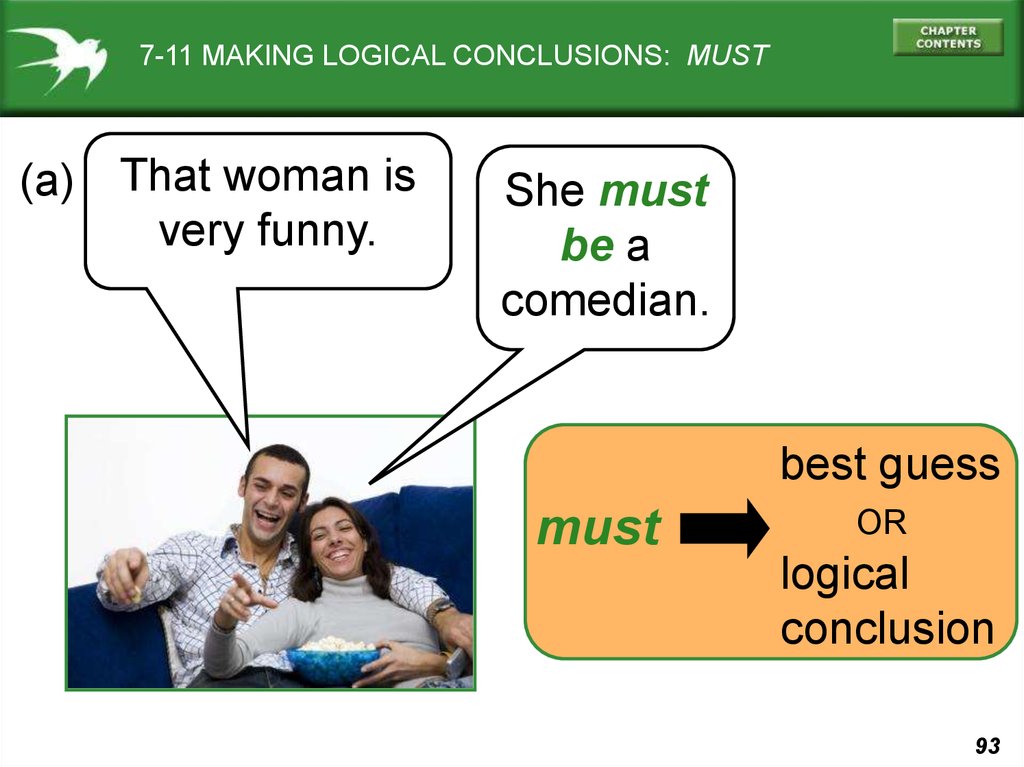


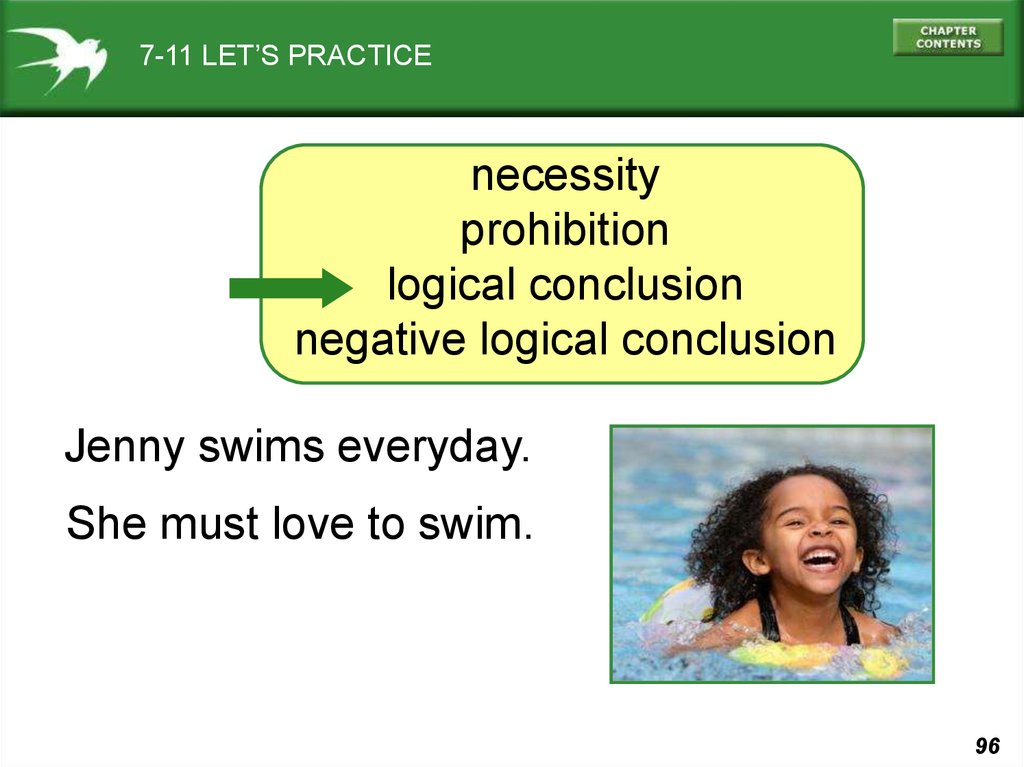

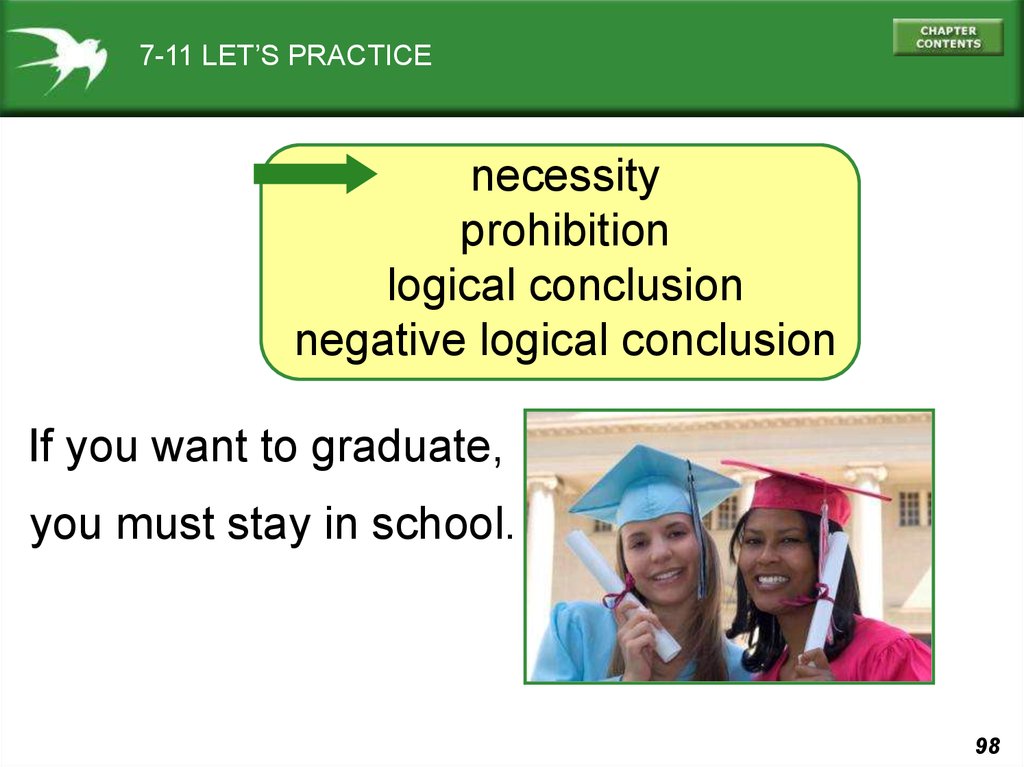



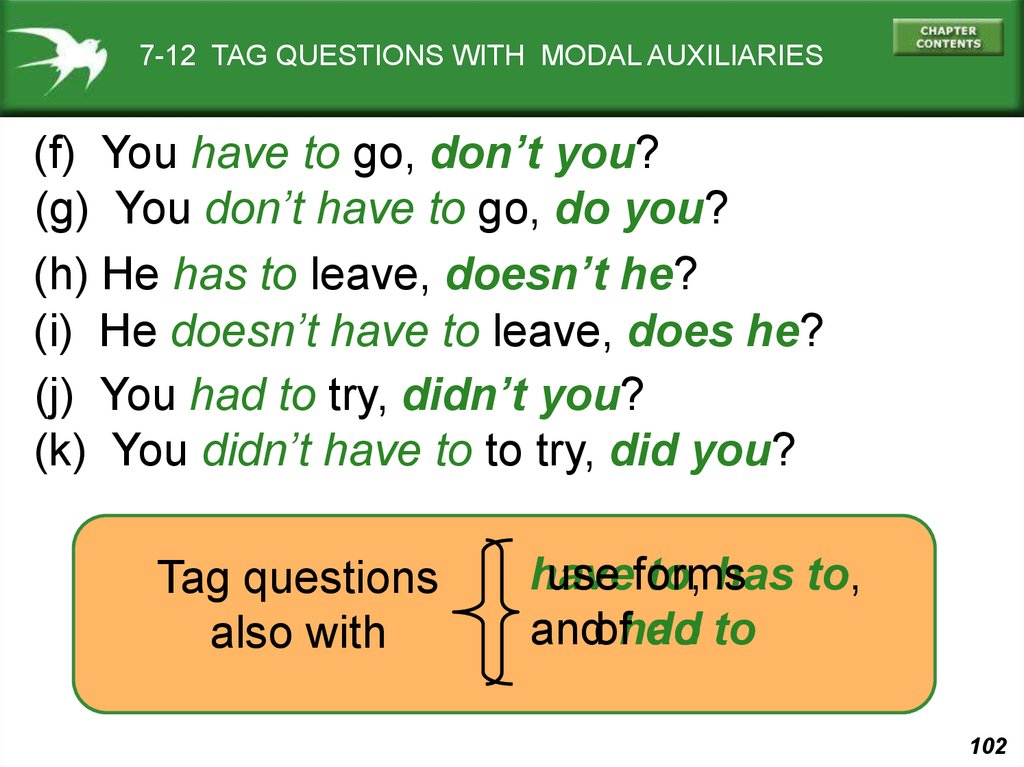
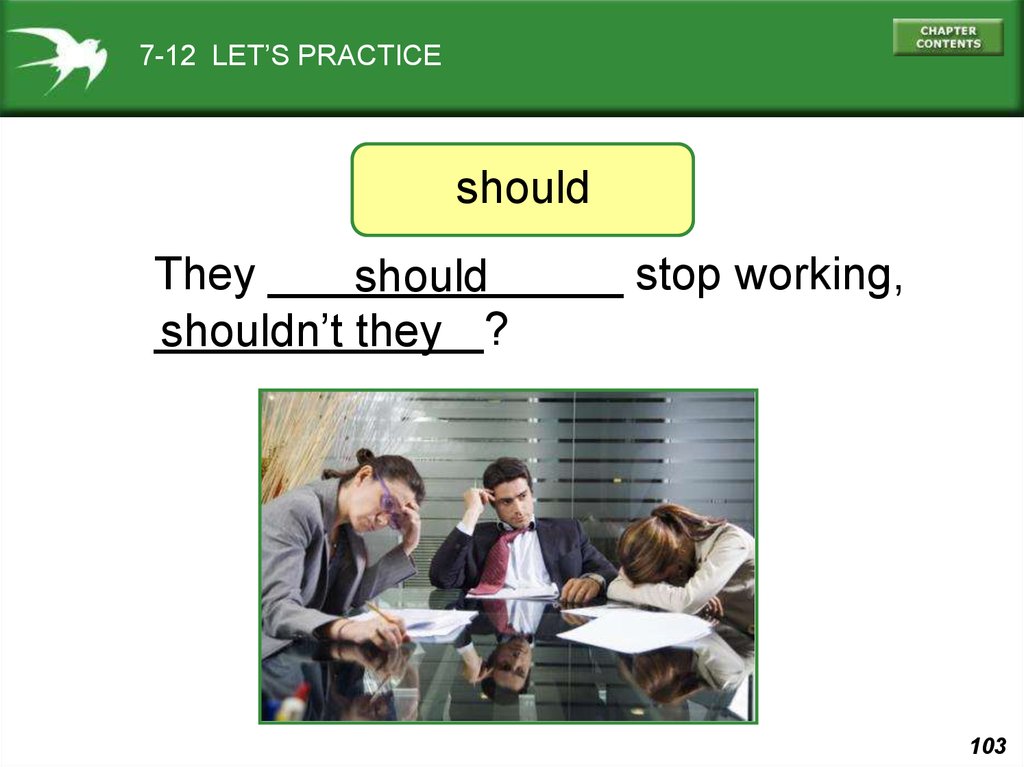
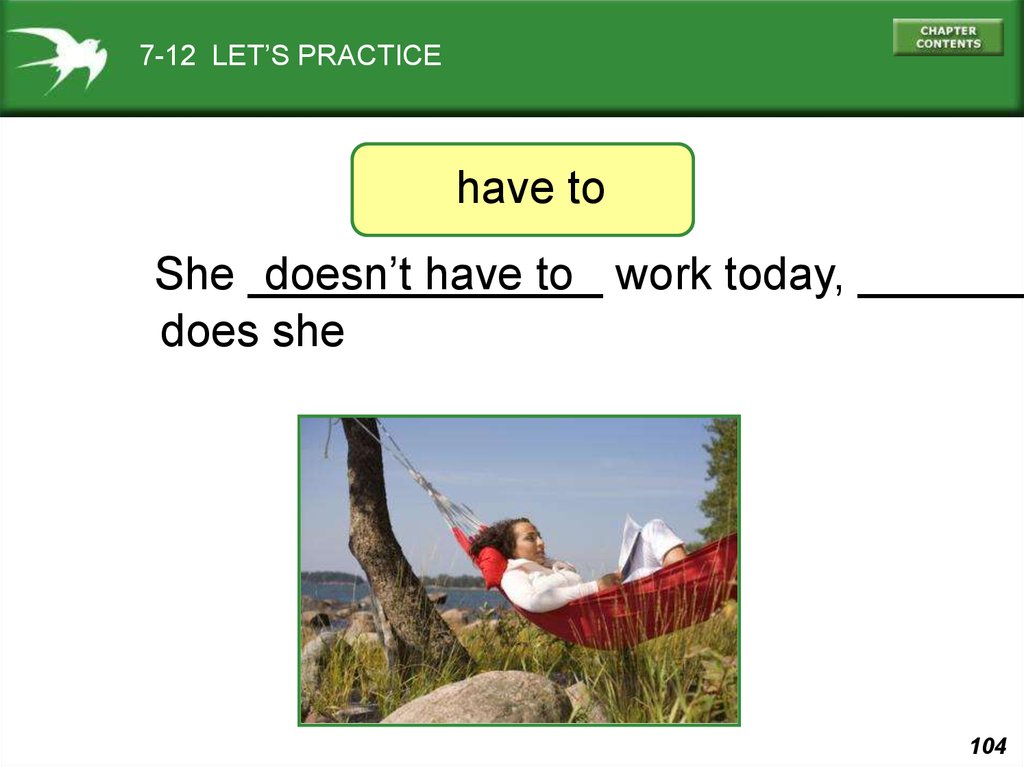
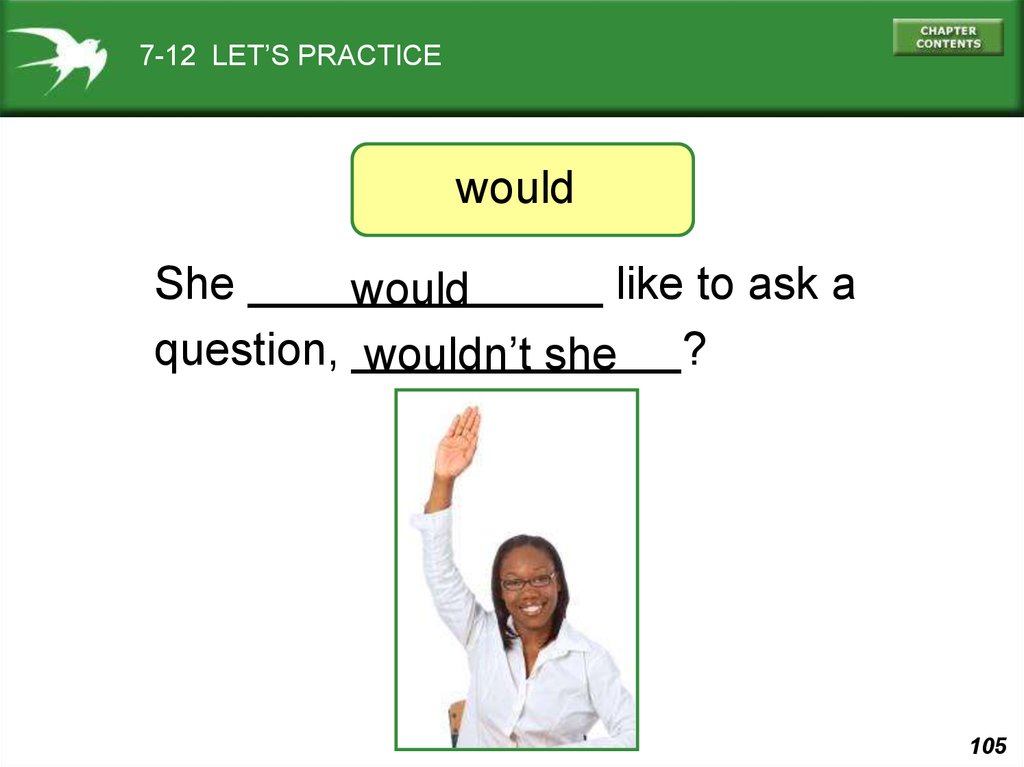
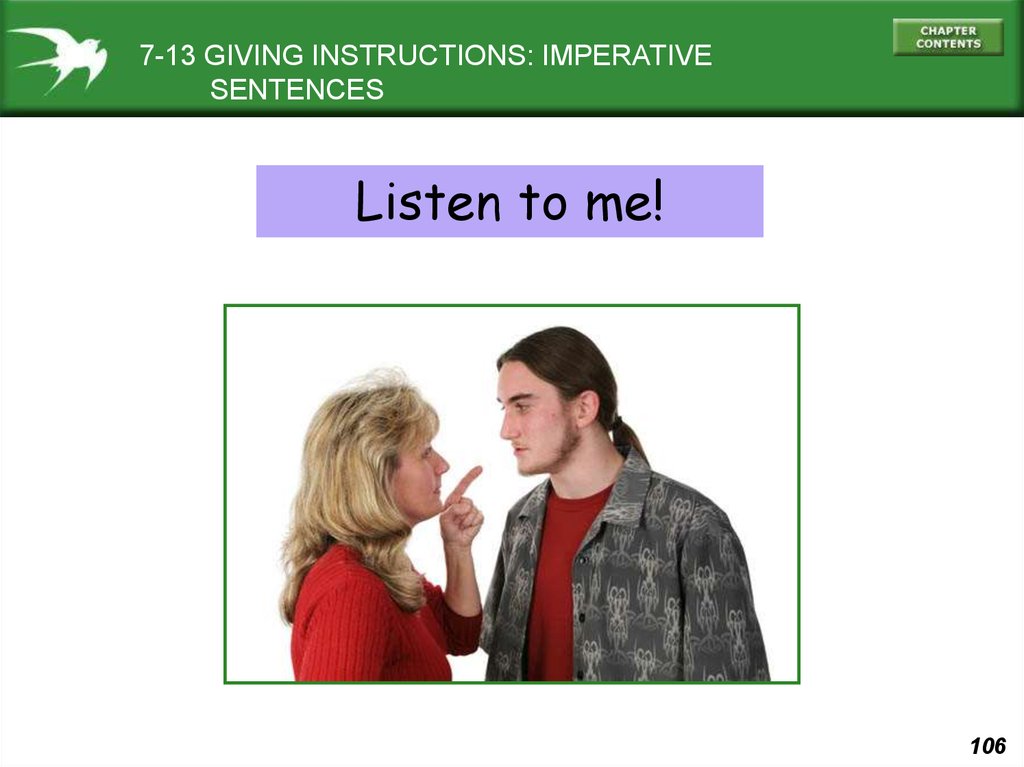


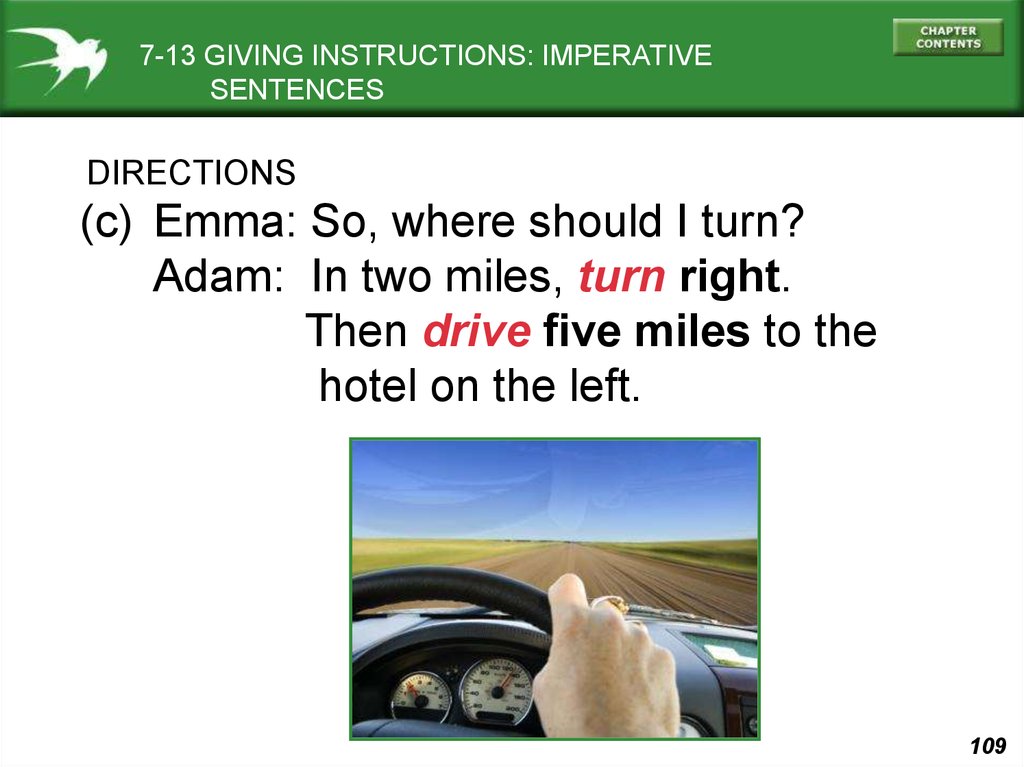


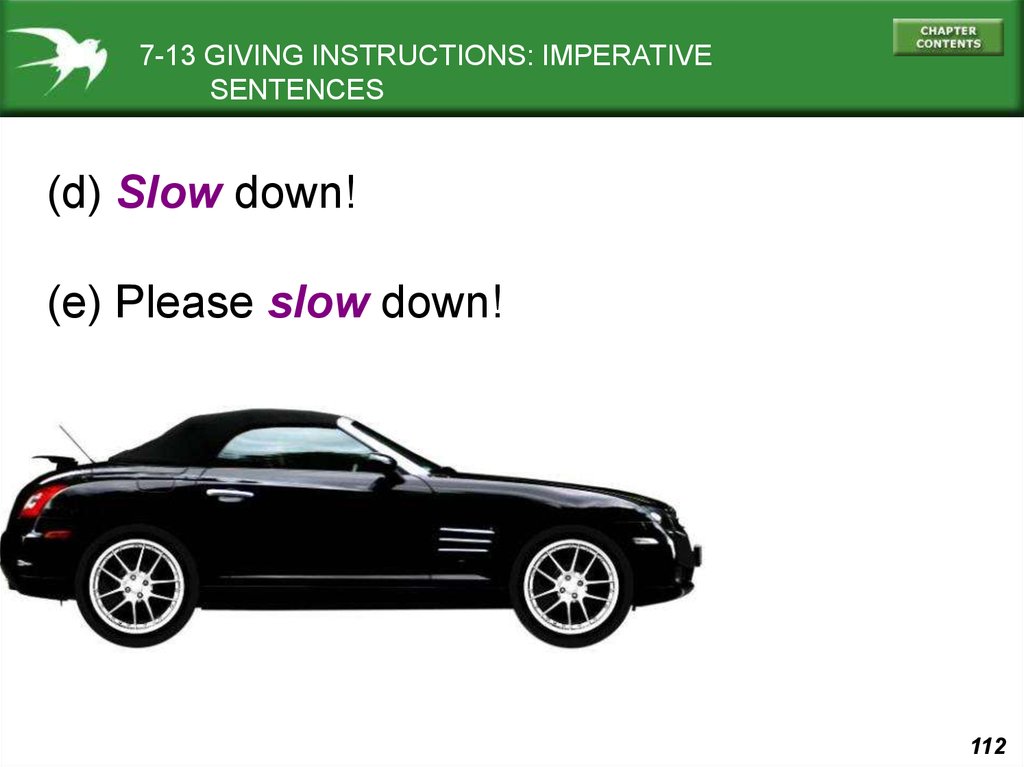

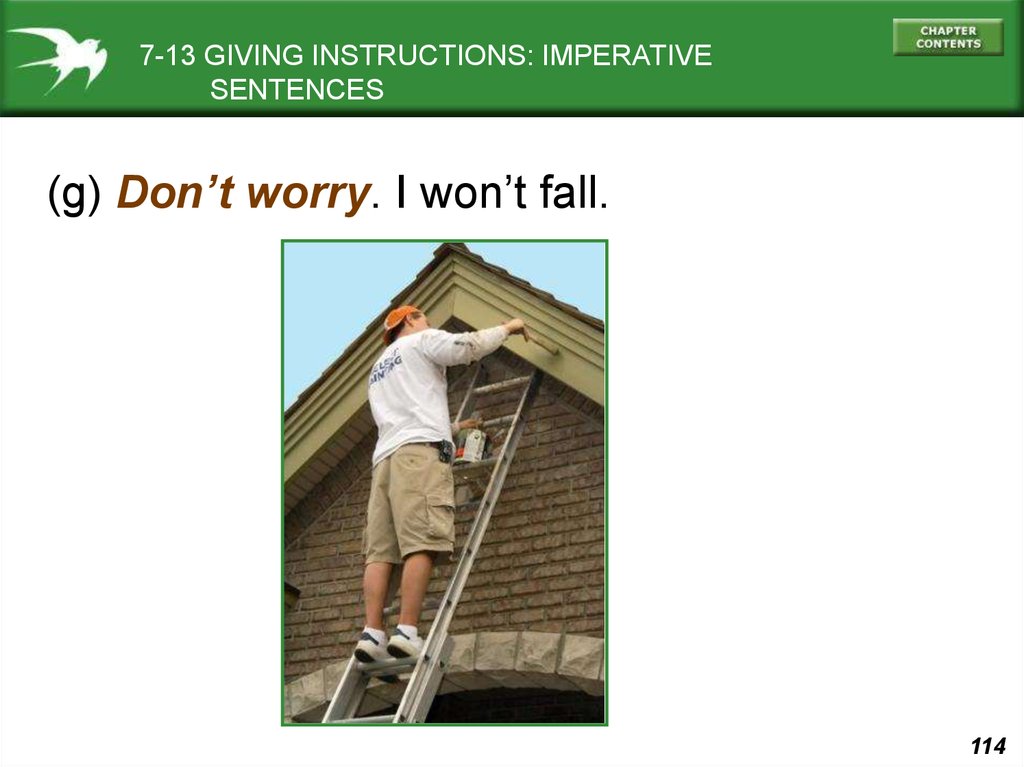
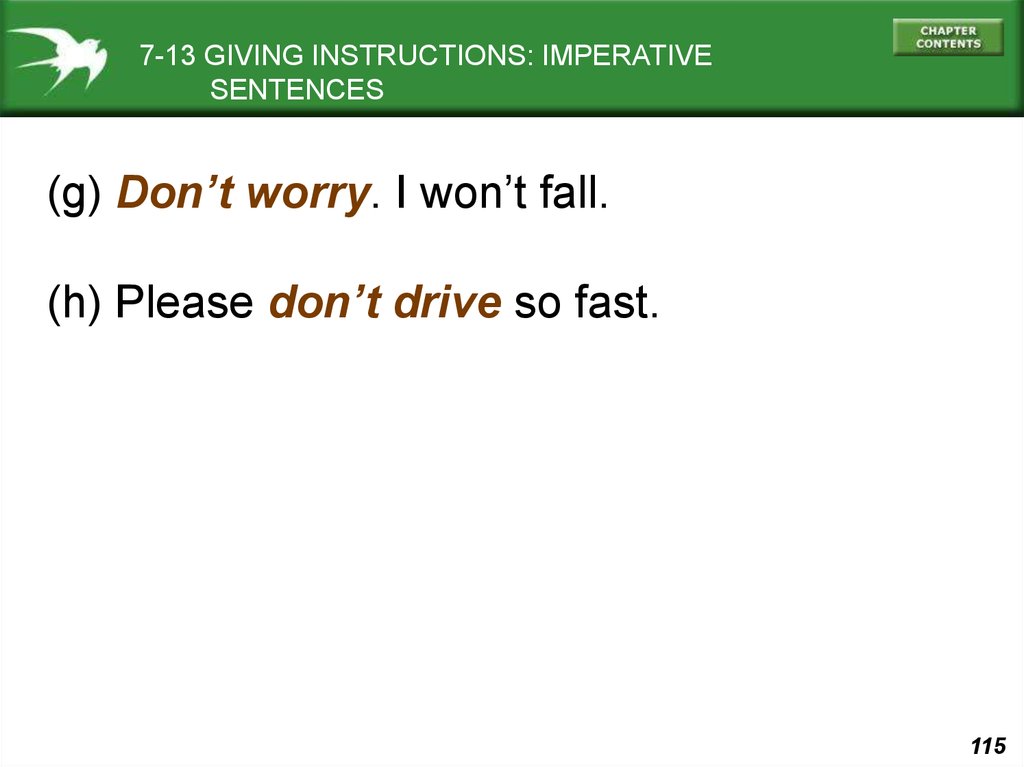
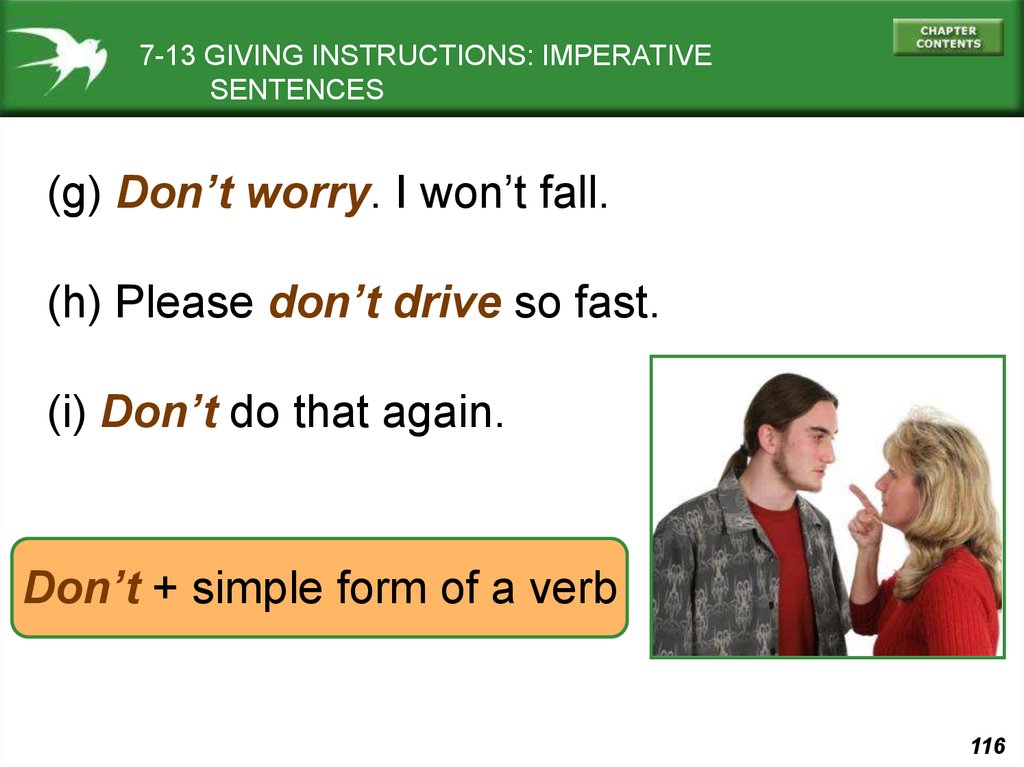
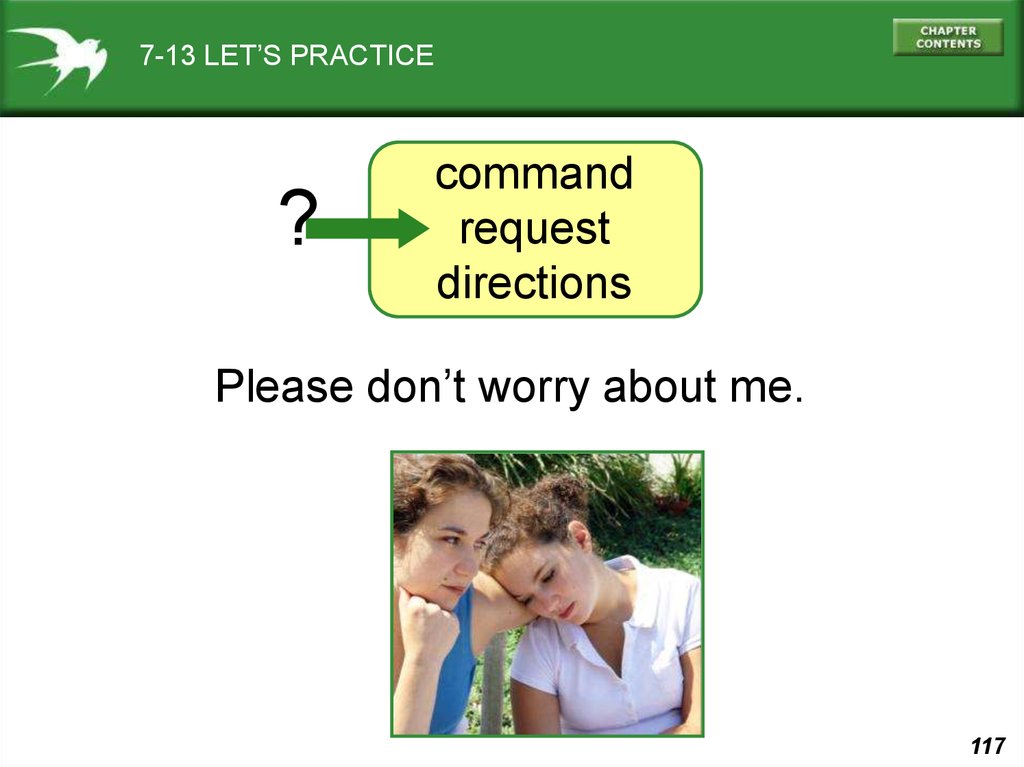
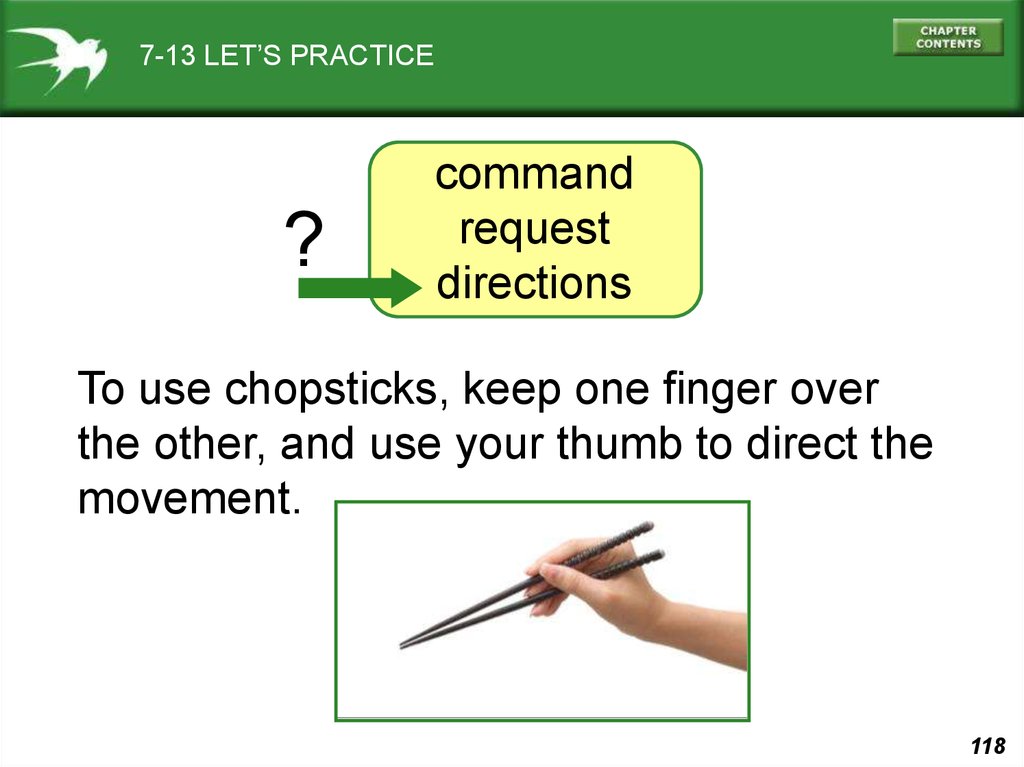

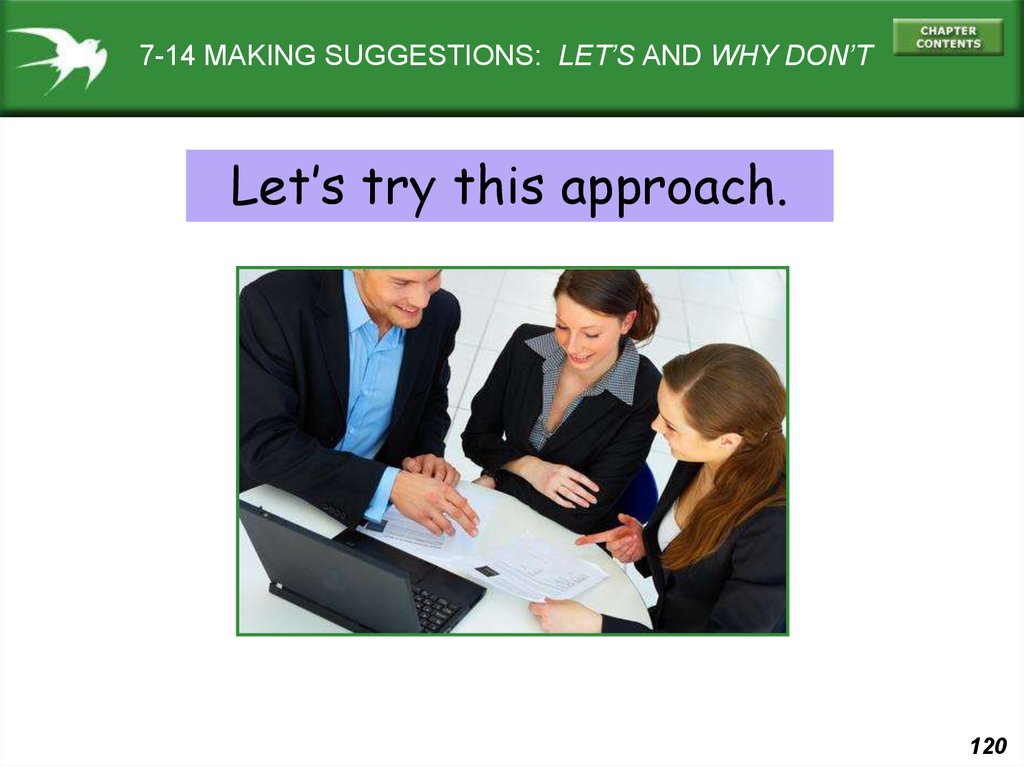
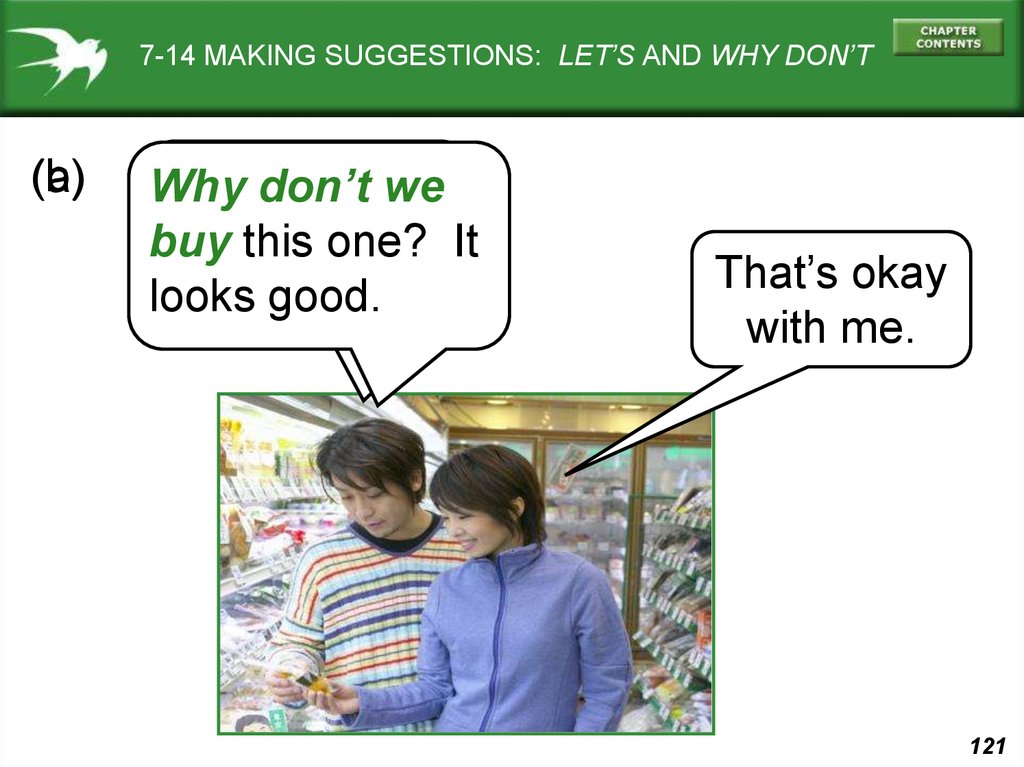
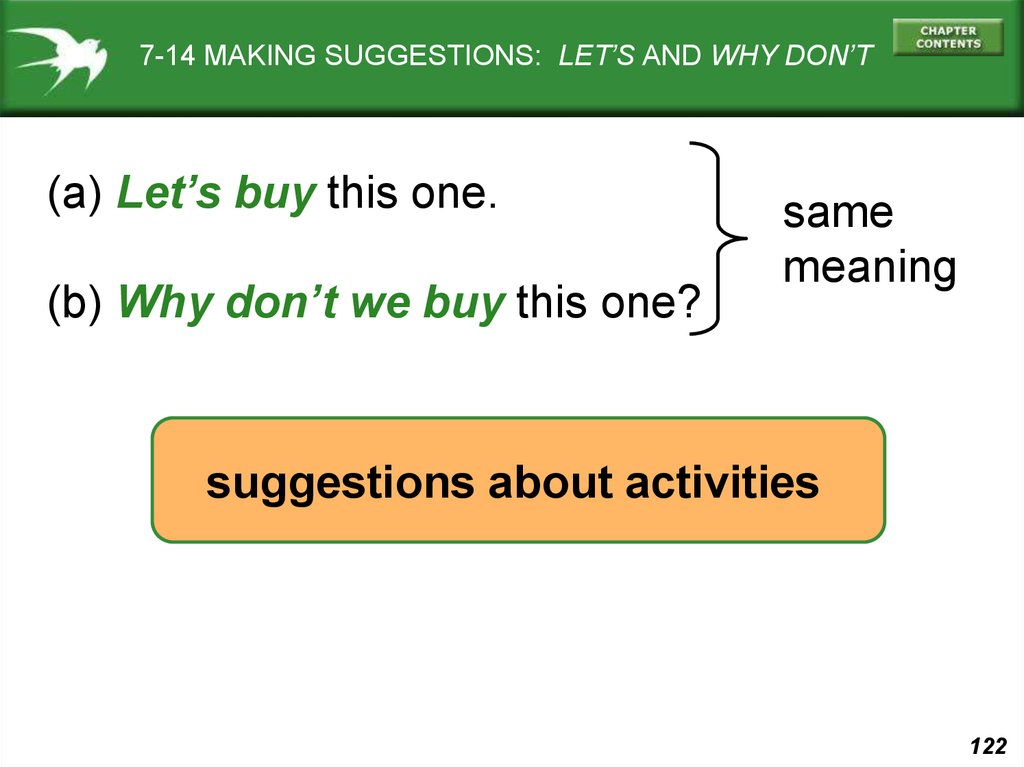
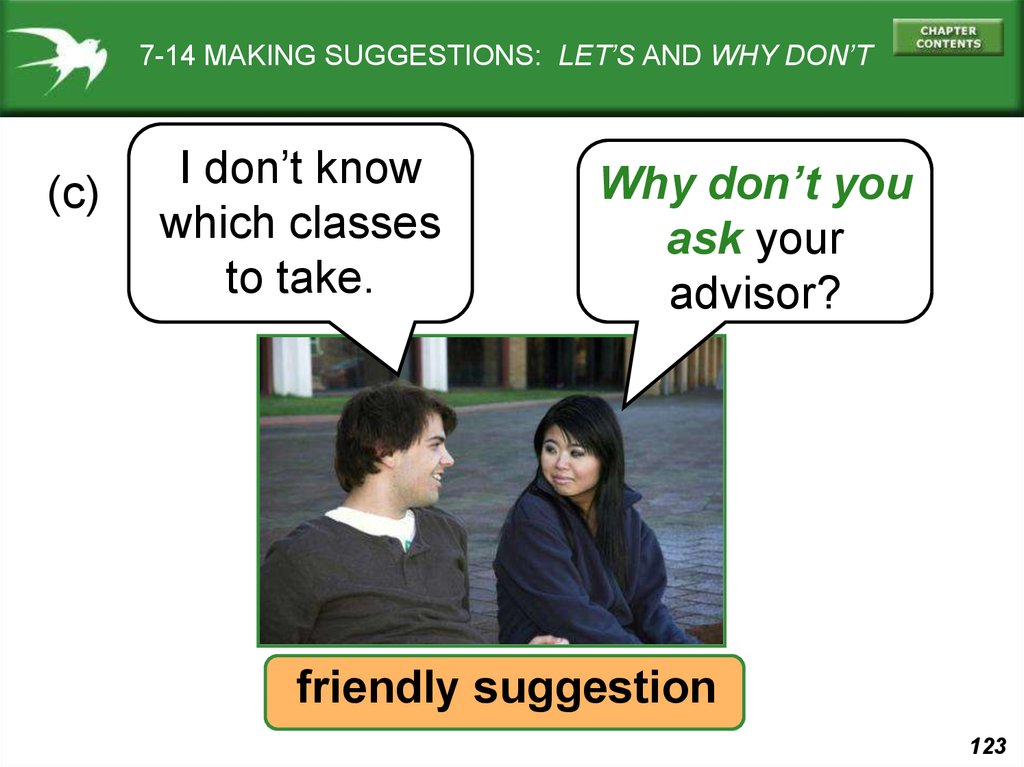
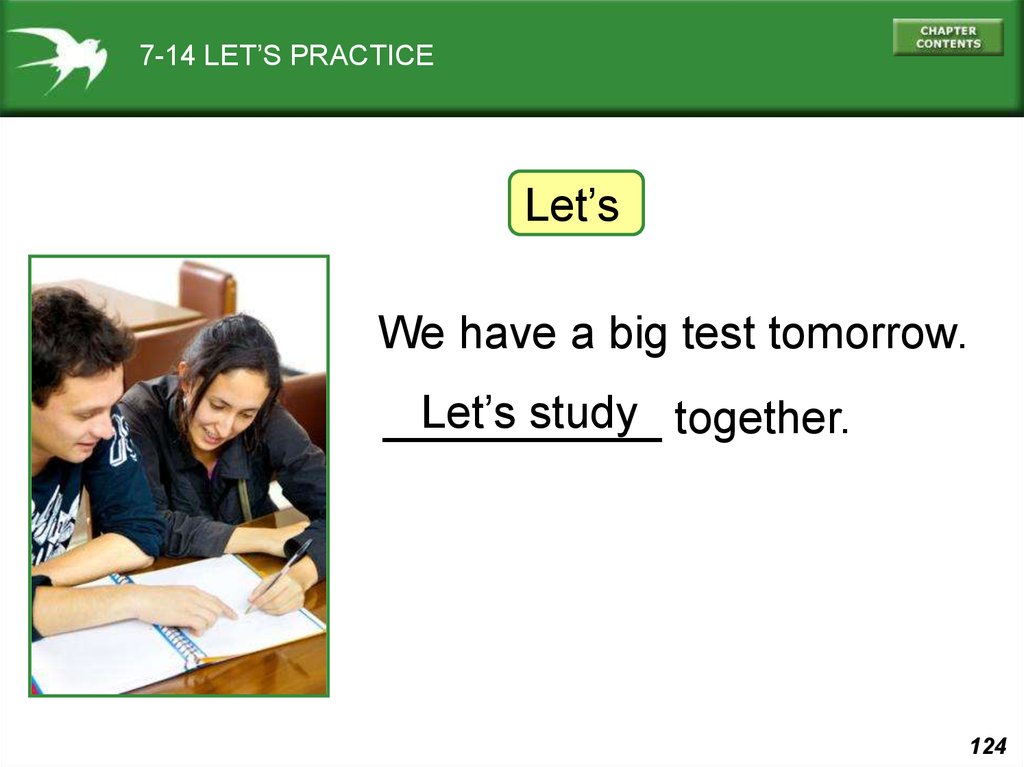
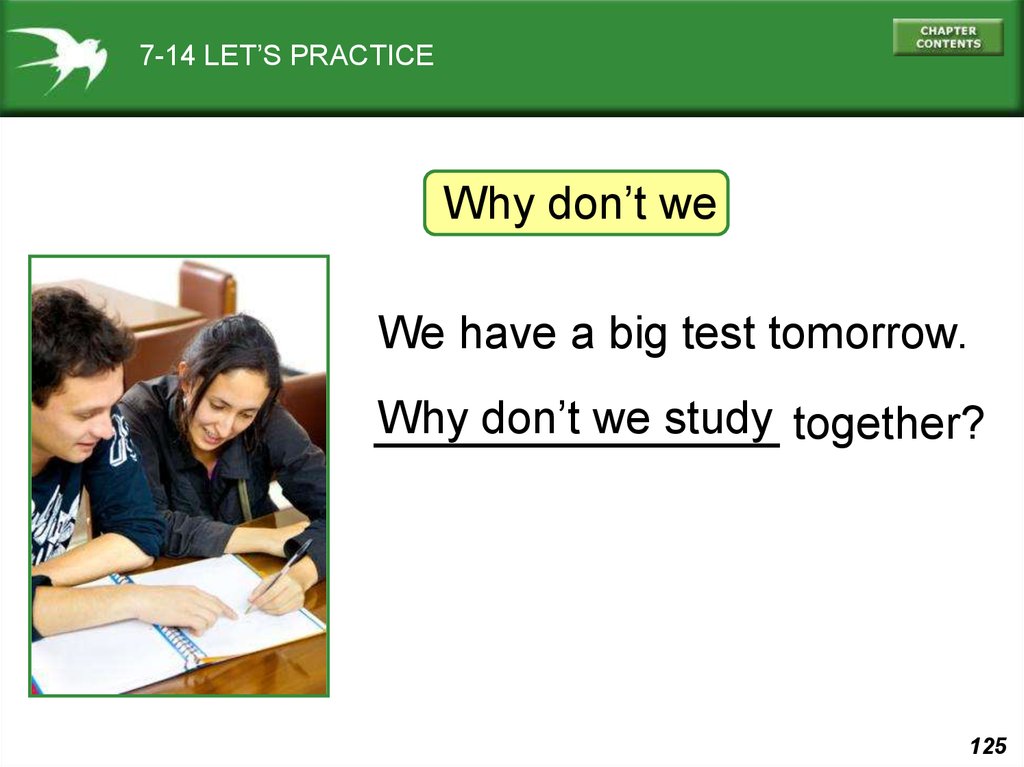


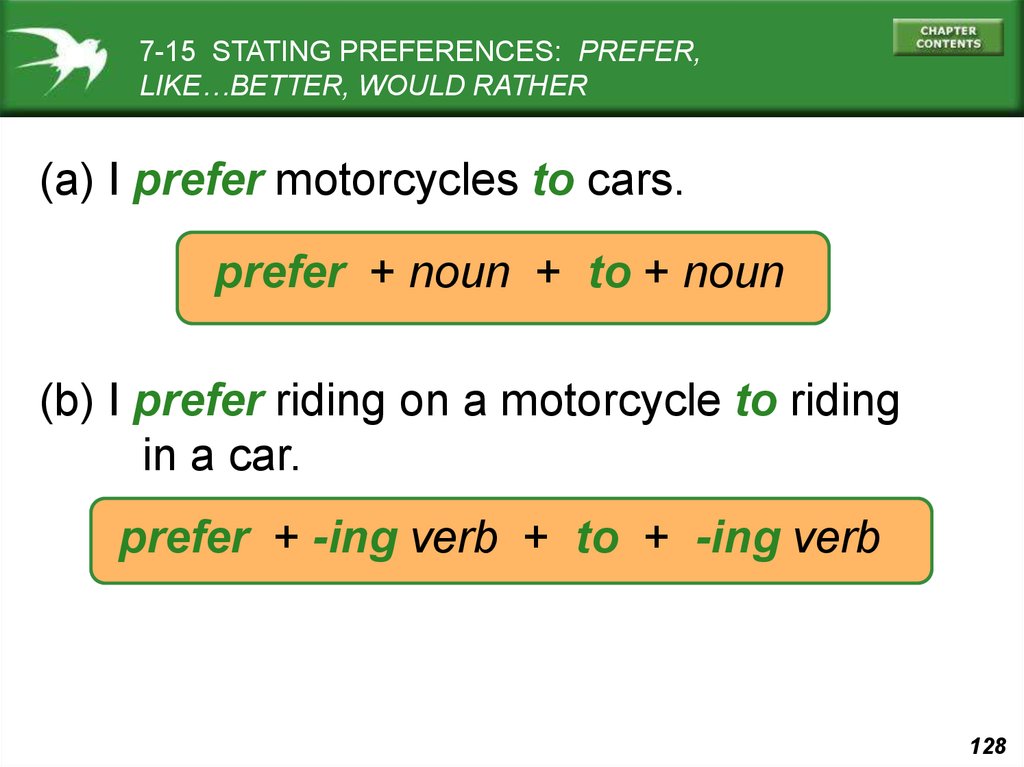
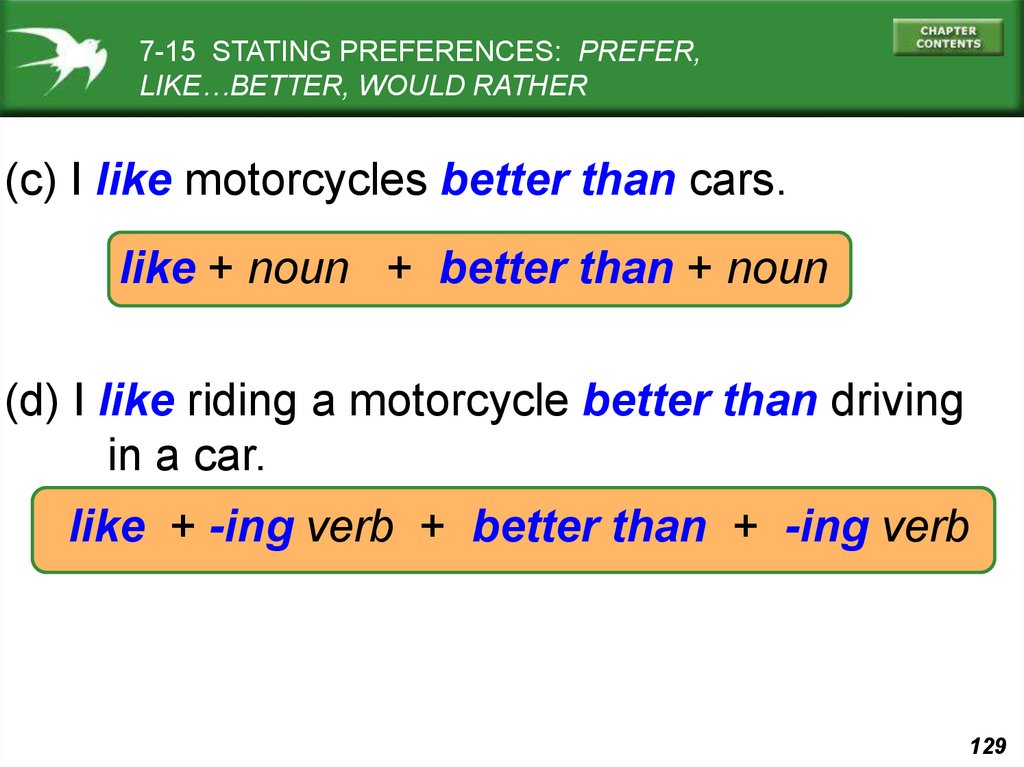

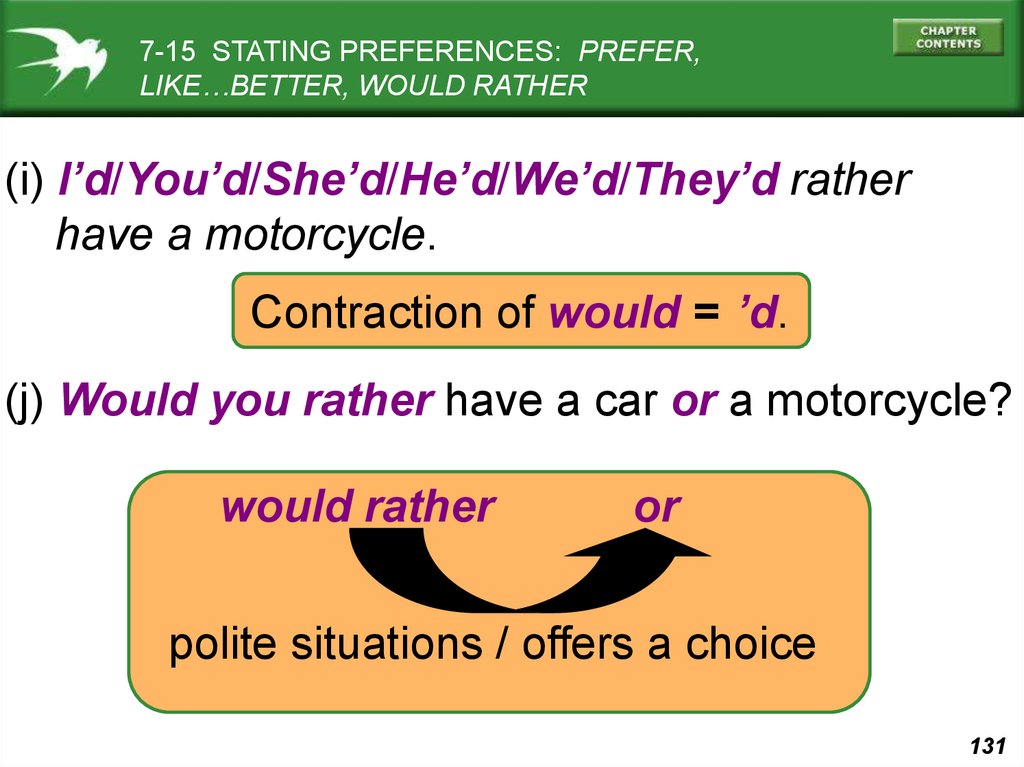
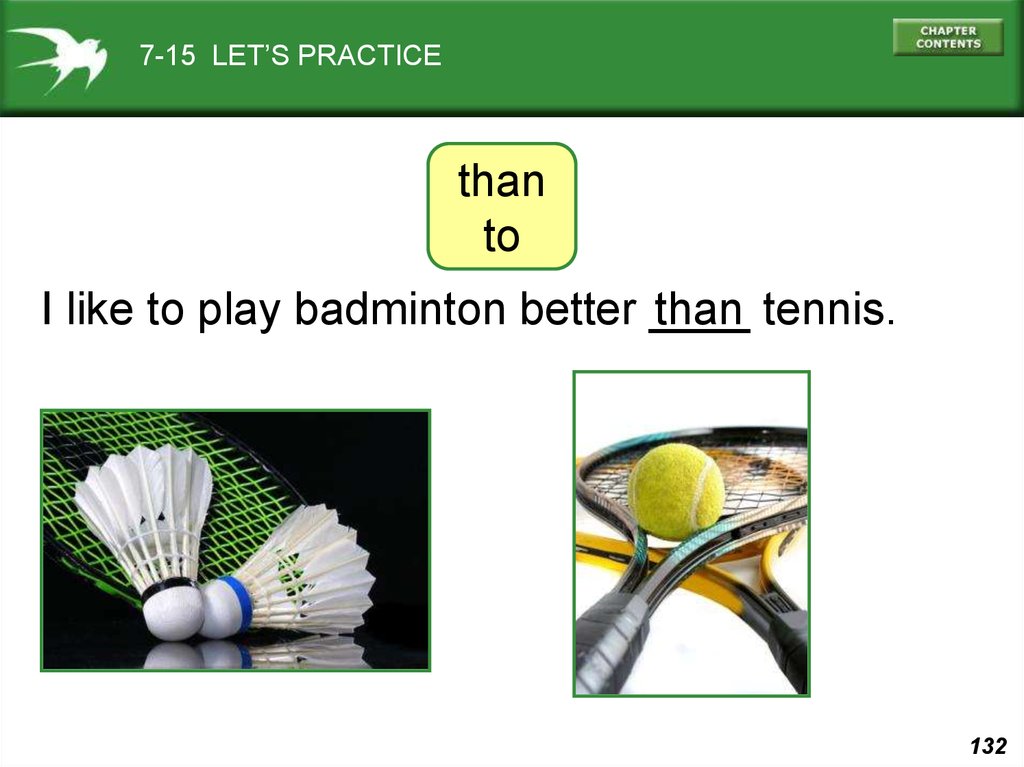


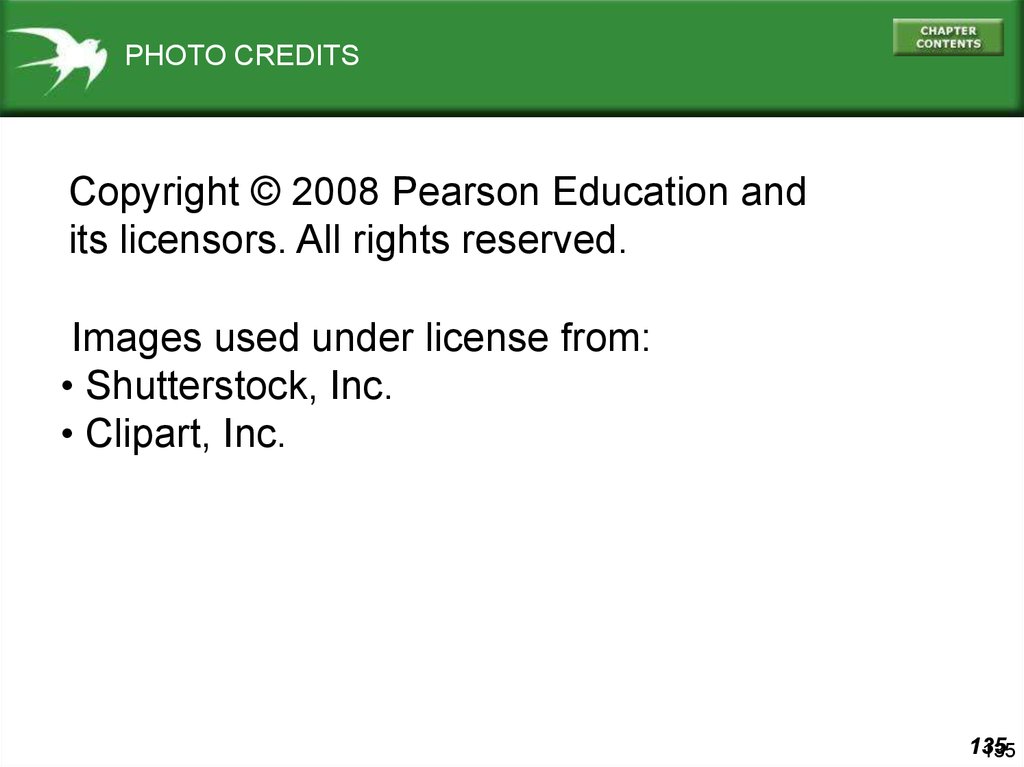
 english
english








